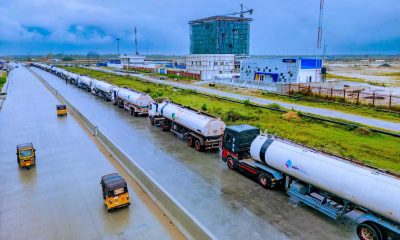
News
IMF Reveals Shocking Truth Behind Nigeria’s Fuel Subsidy Crisis

IMF African Director Clarifies the Organization’s Stance on Nigeria’s Fuel Subsidy Removal,
iexclusivenews – The International Monetary Fund (IMF) has strongly refuted allegations of its involvement in Nigeria’s controversial fuel subsidy removal, marking a significant shift in the narrative surrounding the country’s recent economic reforms.
This revelation comes amid growing public concern over rising inflation and economic hardship affecting millions of Nigerian citizens.

The recent economic reforms in Nigeria have triggered widespread debates about external influences on domestic policy decisions.
Citizens have increasingly pointed fingers at international financial institutions, particularly the IMF, as architects of their current economic challenges.
IMF’s Definitive Statement on Nigeria’s Policy
This online news media gathered that during the high-profile IMF and World Bank Annual Meetings in Washington DC, Mr. Abebe Selassie, the African Region Director, made a groundbreaking clarification.

“The decision was entirely domestic,” he emphasized, adding that the IMF maintains no active programs in Nigeria. Their relationship, he explained, mirrors their standard engagement with other sovereign nations like Japan or the United Kingdom.
| RELATED STORIES: |
| World Bank delays approval for Nigeria’s $1.5bn loan over Naira reform |
| Tinubu’s 7 New Ministerial Nominees and their Portfolios |
| President Tinubu Urge Nigerians to Choose CNG Over Petrol |
Economic Implications and Future Outlook
The policy shift has generated significant ripple effects throughout Nigeria’s economy:
– Increased cost of living for average citizens
– Rising transportation costs
– Escalating inflation rates
– Growing concerns about economic stability
Government Response and Social Protection
Mr. Selassie acknowledged the necessity for robust social protection measures. He stressed the importance of government intervention to support vulnerable populations during this transitional period, suggesting:
– Expanded social welfare programs
– Targeted support for affected communities
– Implementation of poverty alleviation measures
– Development of sustainable economic policies
Infrastructure and Development Priorities
The IMF director highlighted Nigeria’s pressing need for substantial investments in:
– Critical infrastructure development
– Healthcare system improvements
– Educational sector enhancement
– Public resource management
Future Recommendations
Looking ahead, the IMF emphasizes the importance of:
– Sustainable economic growth strategies
– Efficient public resource allocation
– Enhanced social protection mechanisms
– Balanced fiscal policies
The clarification from the IMF marks a crucial moment in Nigeria’s economic narrative, emphasizing the importance of domestic policy ownership while highlighting the need for balanced economic reforms that consider both fiscal sustainability and social welfare.




























